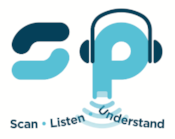Transitioning from High School to College
You did it! Hard work and dedication have paid off. Your child is off to college. If your child has learning differences, you have undoubtedly spent a good amount of time supporting and advocating for their learning needs. What happens next?
Focusing on developing critical skills like persistence and self-advocacy and streamlining the process for students to receive accommodations and supports in college can go a long way to ensuring their success. (2)
The transition from high school to college can be an exciting, fun, and also confusing time for any student. This may be especially true for students with dyslexia and unique learning needs.
Deciding which school to attend is one of the biggest decisions a student will make. For students with learning and attention issues, there are some additional arrangements to navigate. If your learner has dyslexia or other learning differences, there are a few things to keep in mind.
Did you know?
A student must self-disclose and register their disability to make a request for accommodations and they must submit all the required documentation.
Reasonable accommodations are made to provide equal access to learning. Personal accommodations (private tutoring, remedial classes) are not required.
Students monitor their own progress. A college may not, by law, contact parents about a student's academic performance unless the student gives the college permission to do so.
Accommodations are granted to create a 'level playing field,' rather than to help a student reach his or her greatest potential. (1)
Take time to lay the groundwork for a successful transition to college. Contact your institution and request the disability services office. Ask key questions about accommodations that will support a successful transition to college.
The National Center for Learning Disabilities (NCLD) has identified three components that can support a successful transition from high school to college. (2)
1. Reduce Stigma and Promote Self-Advocacy
It helps students more when they focus on self-advocacy, including understanding one’s own needs and being able to explain those needs to others. Because individuals do not grow out of their learning and attention issues, college can be even more challenging without the necessary accommodations.
2. Encourage Resilience and Persistence
Resilience and persistence are skills that can be developed over time, through processes like self-regulation. External factors are also important, like having supportive family members, educators, and community groups. In fact, research shows that having a supportive parent or mentor is imperative to fostering resilience in young adults with learning and attention issues.
3. Provide Access to Information on Accommodations An important first step in finding the right college, is finding information about the services offered at different schools and learning how that school provides accommodations. This information is not in one place, may be difficult to find, and can be confusing to students and parents.
Start the fact-finding process early in the application process at your college or university – even before your student begins the application process. This will help you find a school that is a good fit.
There can be significant differences in the criteria that allows for support in college versus high school. For example, a student’s IEP (Individual Education Plan) is not recognized at the college level. Some colleges will honor a 504 plan, but others may not.
Students with learning disabilities are just as smart as their peers, yet they attend four-year colleges at half the rate. And those who do attend college are less likely to complete it. (2)
Getting off to a good start is the key to success.
Learn more from these resources:


